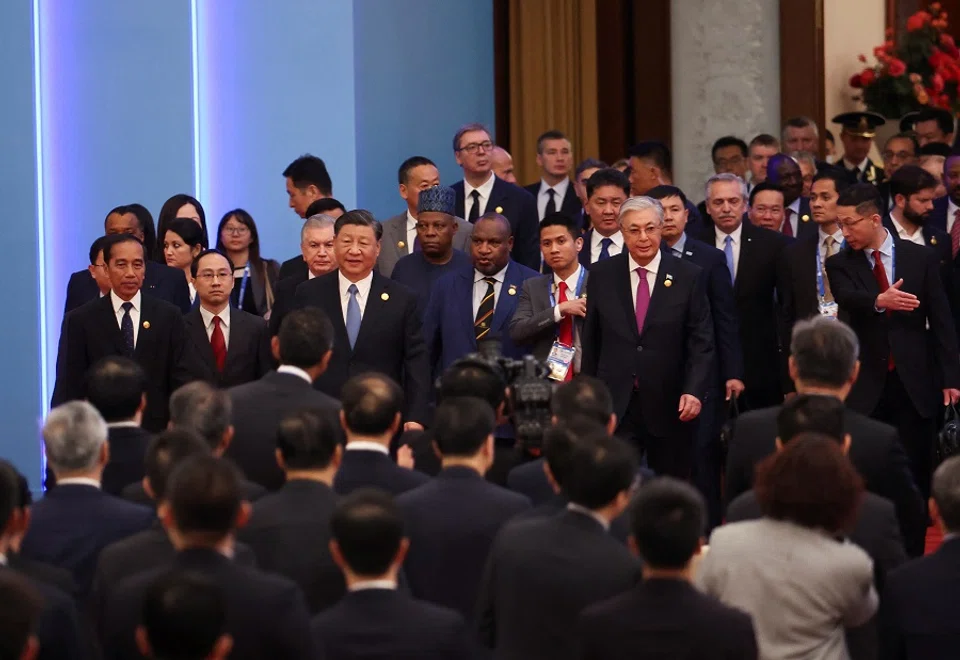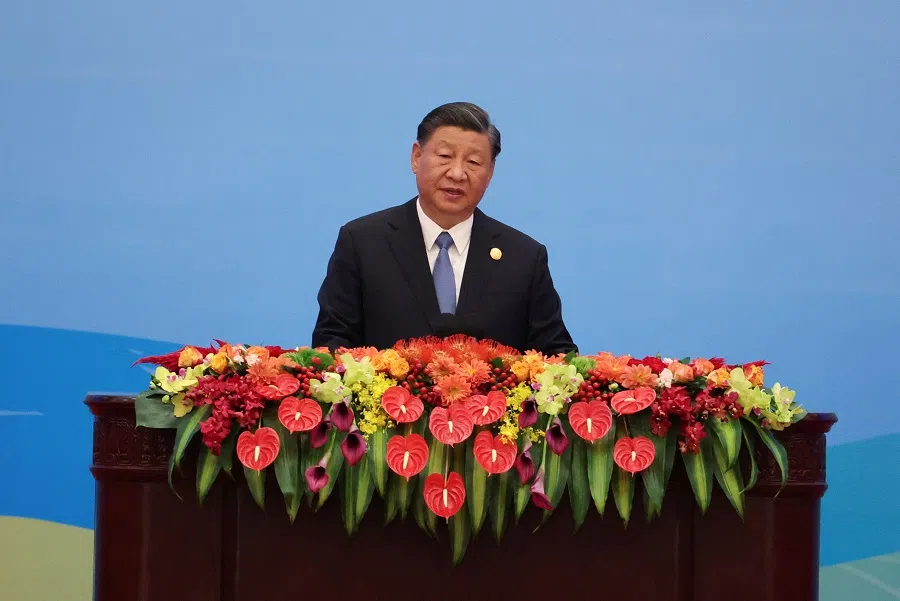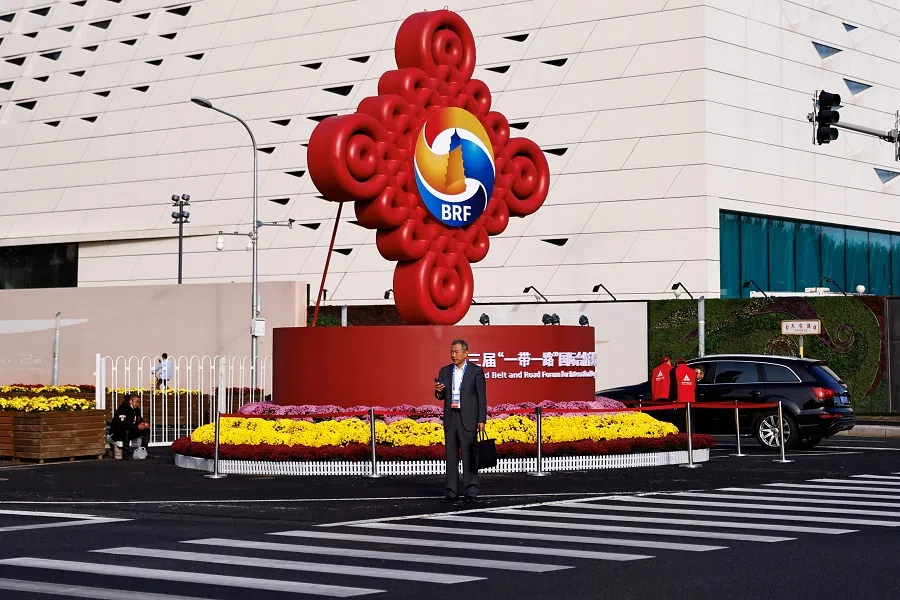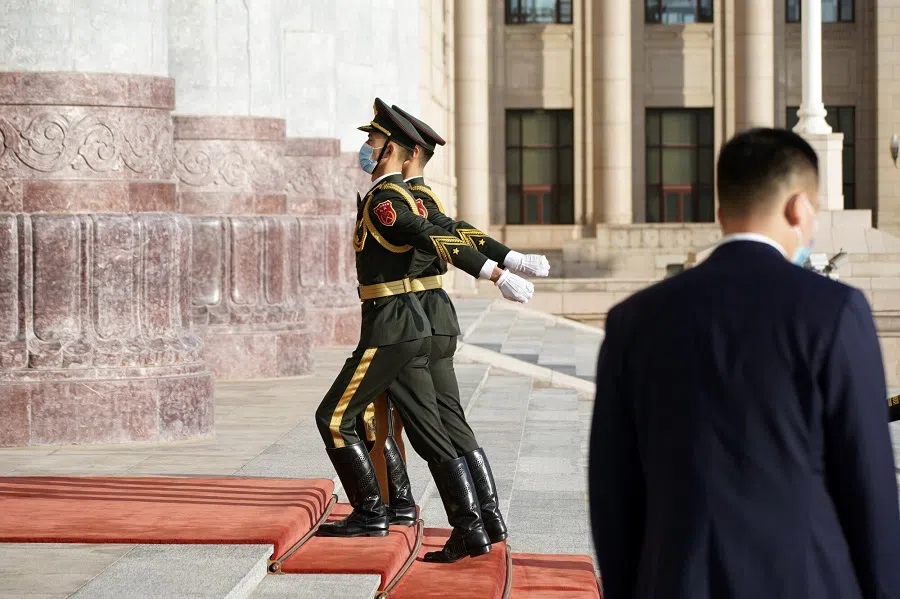Ten years of the BRI: Where does it go from here?
Lianhe Zaobao correspondent Yang Danxu notes that after ten years, the BRI has a somewhat mixed report card. Some analysts say that the BRI has helped some countries, while others observe that progress has sometimes come at a cost, ranging from heavy debt to other indirect effects such as corruption and environmental damage.

The third Belt and Road Forum for International Cooperation - the most important diplomatic event at home for China before the end of this year - opened on 18 October in Beijing. According to official news, representatives from more than 140 countries and over 30 international organisations have confirmed their attendance, with more than 4,000 guests registered.
... looking at the foreign guests that have arrived in Beijing over the past couple of days, it seems that Russia's President Vladimir Putin, mired in the Russia-Ukraine war, is the "A-lister".
The scale of this year's forum pales slightly in comparison to its second iteration in 2019. Four years ago, more than 6,000 representatives from over 150 countries and 92 international organisations attended the forum; leaders from 38 countries including China were joined by the UN secretary-general and the director of the International Monetary Fund at a roundtable, and a joint communique of the second Belt and Road Forum for International Cooperation was issued.
The authorities have yet to issue an official attendee list of heads of state, heads of government and heads of international organisations. But looking at the foreign guests that have arrived in Beijing over the past couple of days, it seems that Russia's President Vladimir Putin, mired in the Russia-Ukraine war, is the "A-lister".
Issues and criticisms
The Belt and Road Initiative (BRI) is part of China's national strategy, and is currently the largest-scale infrastructure construction platform in the world. This initiative introduced ten years ago is also the most prominent foreign policy move since China's current leader took charge.
External observers are divided in their assessment of the BRI. In recent years, the BRI has filled the gap in infrastructure globally, with many developing countries relying on the initiative to build their railroads, bridges, ports and industrial zones.
... the controversy surrounding the BRI persists, with the most oft-heard critique being that it lands poor developing countries in heavy debt.

According to a report published by Boston University this month, from 2013 to 2021 China has provided at least US$331 billion to the global south countries, with African countries alone receiving US$91 billion. Compared to traditional development finance institutes like the World Bank, Chinese overseas development finance has been much more focused on industrial and infrastructure lending, and is more closely associated with economic growth, addressing infrastructure bottlenecks and increased energy access, said the report.
Yet the controversy surrounding the BRI persists, with the most oft-heard critique being that it lands poor developing countries in heavy debt. The Boston University report also stated that over the years, China's BRI projects have contributed to climate change and posed risks to local biodiversity, among other issues.
Moreover, some BRI investments have also led to problems such as corruption and the construction of white elephants, and even cases where a lack of understanding of cultural norms led to bad consequences in spite of good intentions. At a discussion on Chinese sovereign financing on African countries last week, an ambassador to China from an African country recounted a true incident that left one not knowing whether to laugh or cry: to resolve the issue of access to potable water, his country had spent a significant amount of funds to drill a well in a rural area, and even invited a prominent official to grace the inauguration ceremony upon completion. Yet two or three years after the well was built, almost no one drew water from it. Only when they were asked did the locals reveal that the well was built right on the land where their ancestors were buried.
Many developing countries where BRI projects have been launched do not follow the rule of law, with issues such as corruption and inefficiency...
A tool for influence
The West describes the BRI as a means for Beijing to advance its strategic, political, diplomatic and economic influence at the expense of other countries, even referring to it as "China's Marshall Plan".

These various criticisms of the BRI are not entirely just, and there is much political flavour behind some of these doubts. To be fair, any plan of this scale and ambition, no matter how well-intentioned, is bound to run into problems during implementation. Many developing countries where BRI projects have been launched do not follow the rule of law, with issues such as corruption and inefficiency; compounded by cultural clashes, these projects will inevitably encounter setbacks.
However, several BRI projects are too loosely designed, without careful planning and justification. A lack of standards in implementation has also caused many avoidable problems. Besides, while China stresses that the BRI provides opportunities for co-development, it is also a fact that Beijing is projecting its international influence through the BRI, as a vehicle for expanding bilateral relations with third world countries and creating an additional option outside the Western-dominated world order.
There are signs that over the three-year pandemic, China's lending and construction under the BRI have dropped, and some academics are saying that the BRI has taken a "long nap". Other countries are now focused on how China will plan for the future of this initiative on its tenth anniversary.
... deglobalisation and decoupling are on the rise, war rages in hot spots, and the world is at risk of fragmentation amid worsening China-US relations...
A different world
The current environment for the BRI is different from a decade ago. Amid China's economic slowdown, high youth unemployment rate and property slump, loosely-designed massive investments are no longer sustainable, and the Chinese also do not wish to see the country "use money to buy influence".

The international situation has also changed a lot. When the BRI was proposed, the world was at the height of globalisation and the concept of infrastructure-building and mutual connectivity and interaction was popular. Now, deglobalisation and decoupling are on the rise, war rages in hot spots, and the world is at risk of fragmentation amid worsening China-US relations - all this is not conducive to the advancement of the BRI, which emphasises integration.
Amid global turbulence and turmoil, China needs to advance the BRI, and the world needs to cooperate. Based on the fact that the summit still managed to attract many international participants, the BRI is still valued. So, how China learns from the experiences and lessons over the past decade, repositions itself and takes concrete actions to shape a model of cooperation based on norms, the rule of law, openness, inclusivity, mutual benefit and win-win outcomes will determine whether the BRI can be rejuvenated after its nap.
This article was first published in Lianhe Zaobao as "十年一带一路何去何从".





